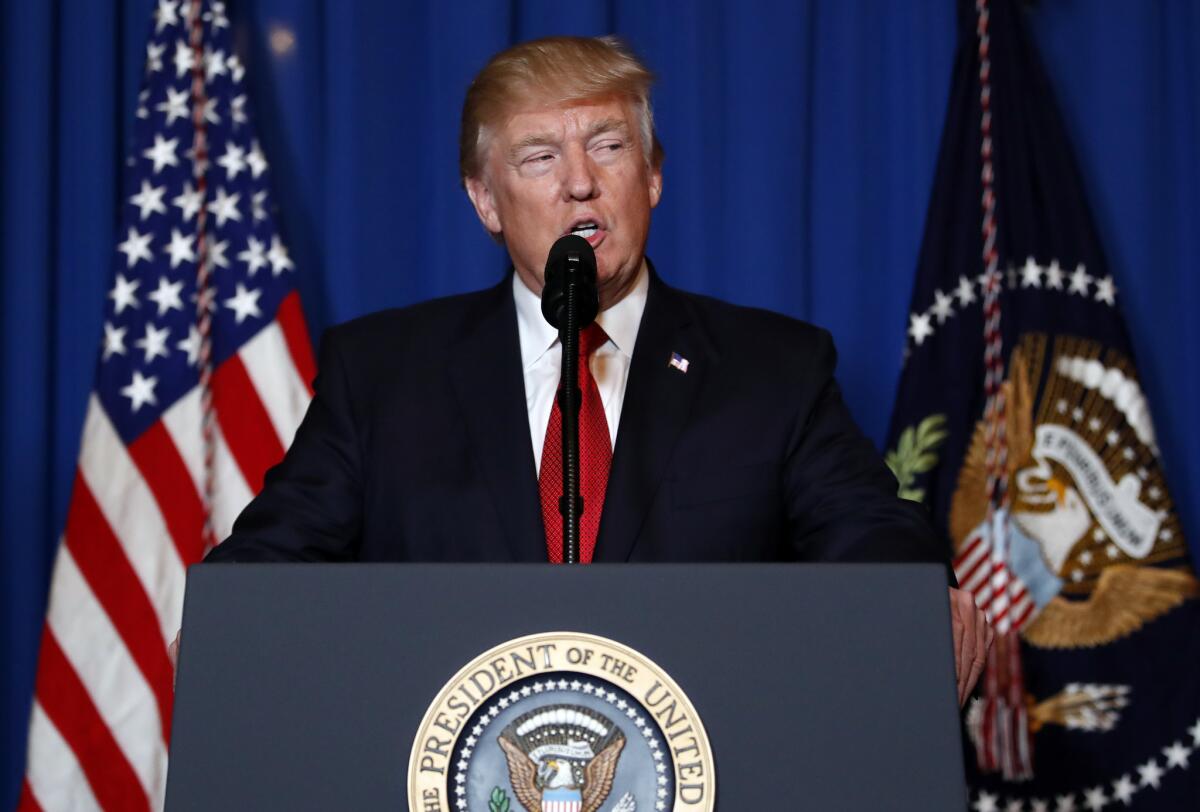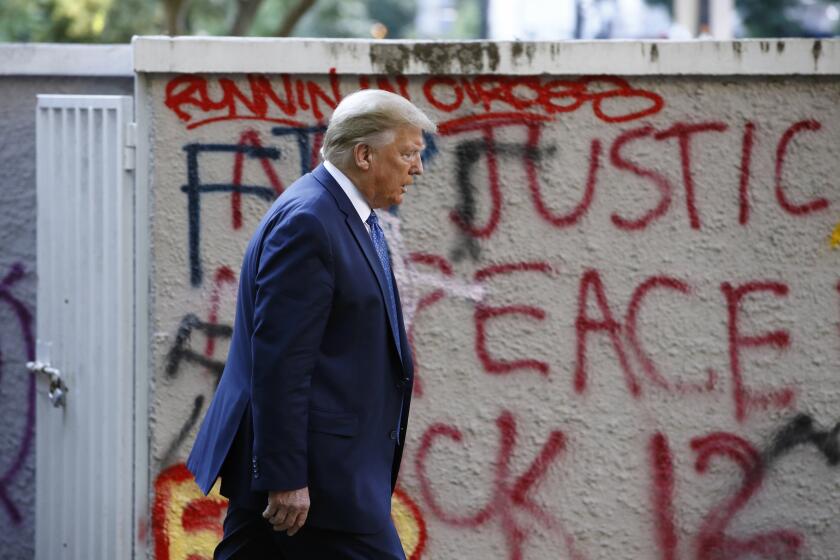Trump says GOP is pulling its convention from North Carolina

- Share via
RALEIGH, N.C. — President Trump announced Tuesday night that he is seeking a new state to host this summer’s Republican National Convention after officials in North Carolina refused to guarantee that the event could be held in Charlotte without restrictions because of ongoing concerns over the coronavirus.
Trump announced the news via tweet, complaining that the state’s governor, Democrat Roy Cooper, and other officials “refuse to guarantee that we can have use of the Spectrum Arena” and were not “allowing us to occupy the arena as originally anticipated and promised.”
“Because of @NC_Governor, we are now forced to seek another State to host the 2020 Republican National Convention,” he wrote.
Several other states have volunteered to host the convention instead.
The announcement came after a Friday call in which Trump had spelled out his requirements for hosting the convention as planned in Charlotte. Trump told Cooper he wanted a traditional convention with a packed arena full of delegates — with no face coverings to prevent the spread of COVID-19.
During the call, when Trump “insisted on a full convention arena with no face coverings and no social distancing, the governor expressed concerns and suggested a scaled-back event with fewer attendees,” Cooper spokeswoman Sadie Weiner wrote in an email. “They agreed to continue talking about ways to have a safe convention in Charlotte.”
Trump’s ‘law and order’ campaign echoes Richard Nixon’s in 1968. But Nixon was the challenger.
But Cooper made clear to Trump that those conditions would likely be impossible given the status of the epidemic in his state, and formalized that Tuesday in a letter to the Republican National Committee. Cooper wrote to RNC Chair Ronna McDaniel that “planning for a scaled-down convention with fewer people, social distancing and face coverings is a necessity.”
The letter came on the eve of a deadline from the GOP for assurances that Cooper would allow a full-scale event in August.
Later, Cooper told reporters it’s unlikely that virus trends will allow a full-capacity nominating convention for Trump to proceed at Charlotte’s NBA arena.
“We think it is unlikely that we would be to the point at the end of August to be able to have a jam-packed, 19,000-person convention in the Spectrum arena,” Cooper said. “So the likelihood of it being in Charlotte depends upon the RNC’s willingness to discuss with us a scaled-down convention, which we would like to do.”
That prompted the RNC to say it would begin visiting potential alternative sites that were offering to host the quadrennial gathering — largely in GOP-led states.
McDaniel, meanwhile, accused Cooper of “dragging his feet” on offering guidance for proceeding with convention plans. She released a statement saying that while the party would like to hold its event in Charlotte, “we have an obligation to our delegates and nominee to begin visiting the multiple cities and states” that have reached out to express interest in hosting.
Republican governors of Tennessee, Florida and Georgia have said they would be interested in hosting if North Carolina falls through. Tennessee Gov. Bill Lee said GOP officials are coming Thursday to scout Nashville, calling the city “the best place in America to have a convention.”
Wednesday was the GOP’s deadline for assurances from Cooper. Last week, Trump demanded that Cooper guarantee him a full-scale event or he would be forced to move the event elsewhere.
North Carolina faces an upward trend in its virus cases, reporting about 29,900 cumulative cases and 900 deaths as of Tuesday. Around 700 COVID-19 patients are currently hospitalized. Mecklenburg County accounted for 4,500 cases — more than double the next-highest county — and nearly 100 deaths.
Earlier in the day, North Carolina GOP Chairman Michael Whatley acknowledged that some changes would likely be needed but maintained that Republicans want a “full-scale” convention.
“Look, we’re not going to move forward with any activities that do not follow federal, state or local requirements and regulations. So, we need to know what those requirements are going to be,” he said.
Whatley said the convention could generate $200 million for the regional economy, especially in the hospitality industry.
Still, two Charlotte restaurant owners said they didn’t expect a huge hit if the RNC moves or is scaled back.
“I feel like it would be a small impact on our business,” said Greg Zanitsch, who owns the Fig Tree near the city’s central business district.
When the Democratic National Convention was held in Charlotte in 2012, he said, an increase in business from visitors was balanced by the fact that his regulars stayed away.
“So, it was pretty much just a normal weekend. We didn’t see a big increase in business because of the convention,” he said.
Patrick Whalen, owner of 5Church in Charlotte, said the convention would be good for the city but added, “Whether the RNC was going to be here or not, we would have done fine.”
Whalen, whose restaurant’s windows were smashed during recent protests over George Floyd’s death at the hands of Minneapolis police, said he thought the RNC could also bring protesters, but the city is equipped to deal with them.
“So my guess is that will probably happen again during the RNC, but hopefully with less violence,” he said.
More to Read
Get the L.A. Times Politics newsletter
Deeply reported insights into legislation, politics and policy from Sacramento, Washington and beyond. In your inbox three times per week.
You may occasionally receive promotional content from the Los Angeles Times.











